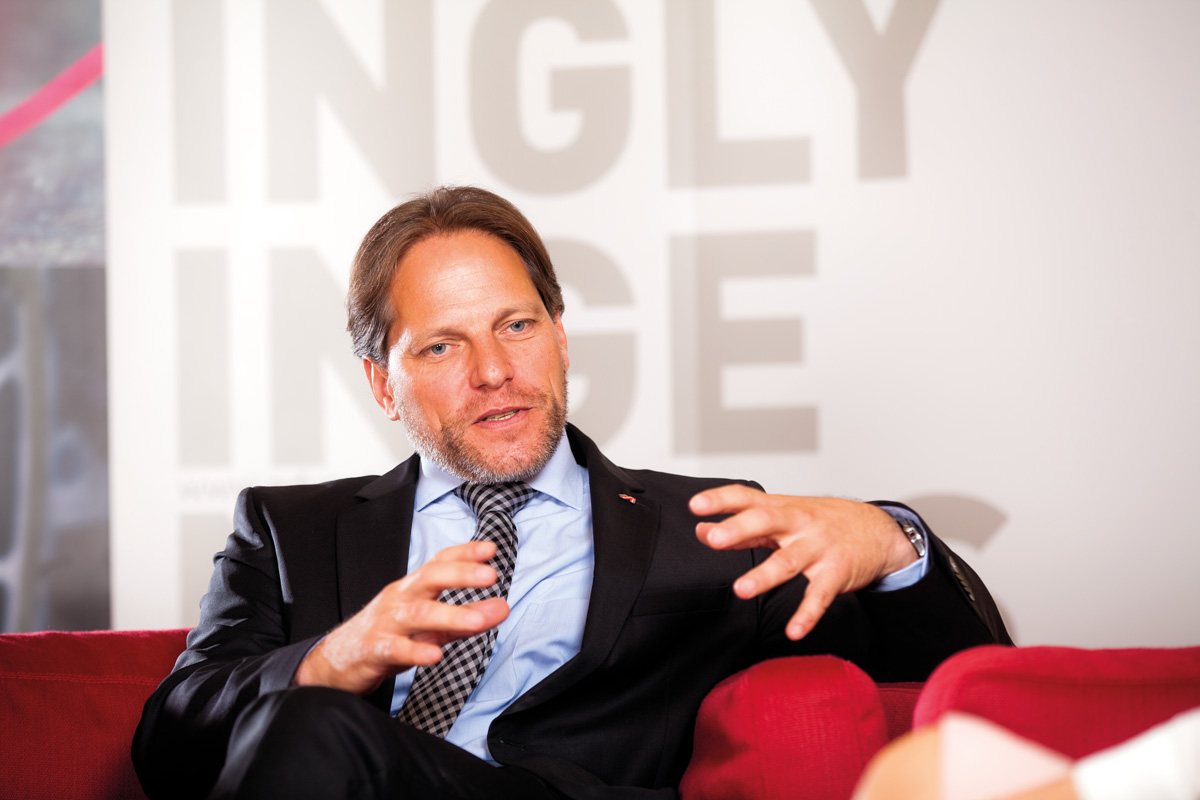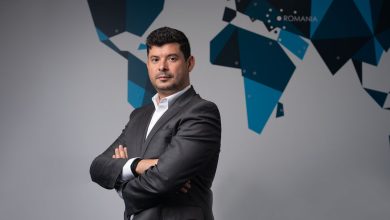Gerd Bommer: Importance of business planning in a stable and predictable environment
According to the Romanian Ministry of Foreign Affairs, Austria is one of the main trading partners and the second biggest foreign investor in Romania in terms of capital invested. Petroleum Industry Review recently met Gerd Bommer, the Commercial Counsellor at the Austrian Embassy, in his office in Bucharest, for a wide-range discussion on issues the energy industry is facing and important common projects in our region.
Mr. Bommer, you started your mission in Romania in August 2016. Please tell us what key topics within the energy sector are on your agenda during your mandate in our country.
Thank you for giving me the opportunity of this interview, it’s very much appreciated. Austria can be a very interesting partner in the energy sector. As you are fully aware, we are one of the largest investors in Romania, amongst the market leaders in about eight to ten sectors, be it oil and gas, construction, logistics, packaging materials, banking and insurance. Austrian companies also play a major role in different sectors, so the mission is a rather big one. We are very much involved with the Austrian companies being present here in Romania. Austria’s businesses have more than 7,000 companies with Austrian capital registered in Romania, but we talk about 1,000 – 1,500 permanently operational Austrian companies in Romania, which is a very high number compared to other countries investing in the country. If you compare this to other assignments I had in the United States, in the Gulf or Scandinavia, one has to say that I am very much engaged with the Austrian companies present in Romania. There is a lot of assistance and support from our side, also in the energy sector. Referring to the energy sector, it was the main task I had over the past years and I guess the main challenges are in the alternative energy sector, the renewables. It is a big topic here and there were several changes in Romanian renewables legislation, which were discussed and introduced in fall of 2016, later on we had an emergency ordinance introduced at the end of March, which were enforced by the beginning of April. More, the level of insecurity was rather high within Austrian companies. As you know, Austrian companies are involved in wind power, solar power and hydropower; there are many energy producers in Romania and for them the changes were a big concern. The change of the legislation of the green certificates influences, of course, the projects strongly, but I think overall Romania has gone a really good way within the renewable energy sector, because the share of renewables in the overall energy production is rather high, considering Romania’s starting point a few years ago – meaning we see big challenges, but also a big success story for Romania. Of course also OMV Petrom, one of the big oil and gas companies in Romania, was very much involved in the sector.
I came to Romania from the Gulf, I came in from Doha (Qatar), getting acquainted with the oil and gas sector as you have to get acquainted with it in the Gulf, as being the predominant economic sector. I’ve worked in New York, Helsinki, Riga, Milan and in the Gulf, I worked in electronics and healthcare industry, meaning I did see different countries, different conditions, but, to be honest, I have never seen a mid-size country with such great preconditions as Romania has – Romanians are motivated, well educated, most of the people are talking about raw materials, also about oil and gas resources. Romania is more or less independent in respect of gas and with the offshore projects Romania may become a net gas exporter, which is a very comfortable situation. Another issue you should look at, in my opinion, is the assistance you can provide to the European Union. Exporting gas to the EU is what the EU needs dearly, especially Austria as well; as you know Baumgarten is the final node where, potentially, the offshore gas from the Black Sea exploration might go to. This could be a big factor of stability, which you bring to the European Union. As said, Romania overall is in an absolutely amazing situation, which I have not seen before in the world – a country with 20 million inhabitants having such great preconditions to be able to build upon.
How would you assess the potential of energy/oil and gas market in Romania compared to the region?
The Romanian energy market is functional; one thing that we see is that there are a lot of changes the government implements, there are thoughts about taxes, royalties and different issues which are being discussed. Given the major impact on the companies in the sector, there is a certain degree of insecurity in the sector. Overall I have to say, that the cooperation between the government and the companies in the sector is really good. There might be things that companies are surprised or disappointed about – changes in the laws and directives have impact on projects, factors that affect the companies’ profitability. Biomass has gone a bumpy road, although Romania has all the preconditions for biomass. As regards the oil and gas sector, considering the situation of Romania in the light of energy independence, the potential is great also for the future.
Major Austrian investors in Romania are involved in the exploration, production, or management of energy resources. What is the point of view of these companies about doing business in Romania? What aspects should be improved in your opinion?
One of the most important issues for the companies is to work in a stable economic environment and especially some kind of certain degree of predictability – this is what companies need. Companies like OMV for instance and other Austrian companies are active in fifty to one hundred markets worldwide, which means they can adapt to different preconditions and situations and I think this is the biggest ability and the biggest asset of companies, that they can adapt to situations, but what they need is a rather stable framework with a certain degree of predictability.
Romania could still improve the degree of predictability in legislation and framework conditions. So, if we talk about taxes, royalties and other issues, I guess, the government should have a close cooperation with the companies. Allowing some kind of pre-warning time would be much appreciated. If you look at OMV Petrom, they have paid huge taxes and dividends for the past year, so the positive impact for the government is there.
Concretely, what do you think international investors would want and need in Romania? What should the authorities do to increase the investors’ interest?
I talked to several hundred companies here and what they really need is predictability, so in certain sectors of course the influence of the government is a strong one. If you have a few large companies in one segment, the government’s decisions have a huge impact, but also in other sectors it is very important that Romania keeps up the good work done over the past few years. The development of Romania is very impressive and I guess this can be carried on as well. There is a lot of work ahead of us if we talk about companies, about the economy, the infrastructure needed to facilitate it. Infrastructure is, in my opinion, the companies’ major concern. Faster and more investments in infrastructure would be very much appreciated.
A certain degree of stability gives the companies the ability to run a return of investment, which companies need to be able to invest into the future. Investment is also the future driver for Romania’s development, not only for the development of the company itself. So, again, I’ll always come back to the same points – stability, predictability is what is needed, but we definitely see certain sectors in Romania where development could be made – this is the tourism sector. The government could do a lot for an initial push which is not done yet. If you compare to the development in Bulgaria, there is a lot of touristic development, so the government could give major impetus in the tourism sector for investments.
We are very happy about the development overall, but we see that in some sectors the government would have to give more push, and especially go much more and faster into infrastructure investments.
Operators and experts in the oil & gas industry are concerned about the recovery in the various sectors of the industry. In recent months, oil prices seem to have stabilized near USD 50 per barrel. Despite this, the market’s outlook has shifted somewhat. In your view, how will energy companies be able to thrive in this price environment?
It was really fascinating, because during the time when the oil price, in the end, went up to the highest level and then fell again to the 50 dollars per barrel, I lived in the Gulf, so I had the direct view on the impact of the oil price and I saw that there is a different oil price or a fiscal oil price that those countries need. It was always talk about prices in Bahrain (over 120 dollars/barrel) and prices in Saudi Arabia or in Qatar (70-80 dollars/barrel) and there was always talk about the US shale cost per barrel. If you look at the fiscal oil prices that the countries in the gulf needed to thrive and survive and if you look especially at the situation in US about the fracking, everybody said fracking does not work bellow USD 70-80/barrel. Nowadays it works below USD 40/barrel, so it is already profitable and the technology developed very well. Again, I am coming back to something which is called stability and predictability. If the issue of the oil price happens over a few years, companies can adapt to it and I guess that’s definitely what happened, because also if you talk about OMV Petrom, you see that they could adapt to it, they can deal with the situation right now. Of course, it had a strong impact, but looking at OMV Petrom, here in Romania in 2017, the investments are going to double compared to the investments in 2016. That shows you that, despite the oil price, there is a future outlook, there is a future expectation on the market and the company’s efforts are profitable. OMV Petrom had a really good first quarter overall. The company believes in the market, the company also believes that the bottom price has been overcome, so the oil price might go up over the next few years again and larger investments – like OMV Petrom conducts right now with ExxonMobil in the offshore gas exploration – is beneficial. If companies will be able to adapt to certain environments, that will help them as long as the situation is stable on the fiscal and regulatory side and the same for every company. I guess this is the reason for concern sometimes in Romania, because the situation has to be the same for all the companies, this allows for free play of the market and the competition will get balanced by itself.
One interesting point to be mentioned: without continued inflation and seen over the long run (many decades), the oil price has a rather linear development, so everything that happened was a relatively small movement up or down. Overall, the oil price is stable, of course we are at the low end if you calculate inflation, but the oil prices will go up again and, if you look at it over one hundred years, you see a very linear stable trend in the oil price, especially if you calculate it in euros.
We lost many professionals during this downturn cycle within the industry. How will it be possible to replace them?
It is definitely a tough issue, we have seen it because we are always in contact with Austrian expats. OMV Petrom has decreased the number of expats, especially over the last two years, but it derives from two factors. Factor number one is the development of the company. OMV acquired a big share in Petrom and then managed to do a turnaround. Petrom was not the most profitable company at that time and it was a real turnaround for which OMV brought in a lot of expats. The oil price now of course forced them into sending many expats back home, but there is a strong second factor present in Romania. In terms of managers and of know-how, Romania has excellent know-how and people. For me also, as I have been all over the world by now, it’s a situation which is completely new, that expats are actually not needed that much in Romania, as the Romanians are really clever people, with a lot of technical skills and overall know-how, and also with great motivation and ambitions. There is a study from an Austrian company, Target Executive Search – which conducted a study about managerial skills all over the SEE countries and Romanians came in at second place. I talked to Klemens Wersonig, the group’s CEO, and asked him what he believes the main reasons are. He said that is just the great education and know-how which Romanian managers possess and the ambition and motivation. I guess this is one of the points especially for OMV Petrom as a large company, being able to replace experts with locals.
The work on BRUA (Bulgaria – Romania – Hungary – Austria) gas pipeline is scheduled to begin later this year, and the interconnector will be operational in 2020, when ExxonMobil and OMV Petrom will start natural gas extraction from the Black Sea. Are there any energy projects you find most promising in our region?
BRUA is not going to be the only answer to the gas exploration in the Black Sea, because BRUA does not yet have the connection to the Black Sea gas exploration. Connections to the Black Sea will be necessary, but BRUA will definitely assist in bringing new independence and new and different negotiation power in Europe, as you have North Stream and other different long distance pipeline connections, which are either already built, or in the planning or envisaged for the long-term future. So it is a big development for Romania, but it is also a big development for Austria, as the final node for the gas transport. OMV together with Petrom will play a major role in the development of the energy sector in the region.
Overall, I see the developments in the energy sector as really strong, in terms of alternative energy, and this is something that we can build on, Austria has one of the highest shares worldwide, with 70 – 80% of energy coming from renewables.
Talking about Austrian energy companies operating in Romania, how do their results for 2016 look like? Do you expect more of the same in 2017?
The results in the oil and gas sector are getting better, we will have poorer results in the renewable energy sector, especially solar power projects are facing difficult times right now. We also saw that biomass projects are facing really difficult times, which derive from the eligibility of biomass for green certificates, so in that sector the green certificates changed the profitability and the projects’ return. We do have biomass projects, we do have solar power projects which are in a very difficult financial and economic situation. The wind electricity production shows slightly better results right now. One must not forget that especially solar power projects and also wind power projects are projects that can be taken out of the country. If investors do not see that in the near future they are going to have a return of their projects, they also might take the projects out of the country. Electricity consumption is growing permanently, so there is a demand behind it, as long as the offer and the demand are equal to build the price. We definitely have a chance for good prices, but right now it’s very much regulated by the state, by OPCOM, the prices are more or less set, so we are facing a bit of a difficult time. In the energy sector, we see many changes, projects having to stop the operation, some projects, which are being offered by the banks – might be a solution for some of the projects, but not for all of the projects.
In terms of oil and gas market, it might be a prosperous outlook. The prices are at the lowest level, obviously OPEC does not have that much influence on the oil prices, as it would wish for (OPEC is headquartered in Vienna, Austria). Overall, we see many opportunities right now – the US becoming net exporter of oil and gas in the future, so markets will change, the prices will go up again, economy is currently developing really well, different institutes are lifting predictions for the economy up, overall the world economy is much more stable and getting better right now. Increased demand means increased prices, so I think we can be positive about rising prices in the oil and gas sector again up to a sustainable level that maintains the industry’s ability to invest.
What are your thoughts on the future cooperation between our countries?
Austrian investors have been in Romania for a long time, our two countries always have had longstanding cultural ties with each other. Austrian companies, and this is specific about us, if they come, are here to stay. I think this is the most important factor for Romania as well, to have stable investors and as you have seen over the past few years, Austria is a stable investor. After the crisis Austrian investors stayed on the market and the Austrian companies went on with their investments. If we look at investments, companies like OMV Petrom have invested in the last 12 years more than 10 billion euros. One factor we see – there are not too many new Austrian companies coming into the market anymore, we still have companies coming on the market, but we see a major move from new investments towards modernization investments, efficiency investments, enlargement investments, all kinds of replacement investments. In competition for capital with other destinations, Romania should ensure stability and consistent dialogue, but also modern infrastructure and labour force. A big factor which also helps in the development of a country like Romania is that Austrian companies are bringing in a lot of know-how, a lot of technologies and capabilities-abilities, and this is something Romania can profit from.
And finally, which are the biggest energy challenges facing humanity in the near future, in your opinion?
Generally speaking, I guess power grids are one big issue, so what I personally think is that the energy production and especially energy storage has to be changed. If we talk about mobility, everybody speaks about electric cars, I’ve already discussed with my friends about it and only few private persons invest into an electric car right now. Hydrogen comes into the game, another thing is the energy production has to be decentralized. The decentralization of energy production and the energy storage decentralization will completely change the face of the industry. We will also see disruptions in the energy sector as for instance the battery technology of Kreisel Electronic from Austria.
Gas is definitely clean energy, it is one of the future opportunities, gas can be transported by pipelines but it could also be transported via LNG and ships. So, Romania has future options, there are many development opportunities especially for Romania in this sector. Overall it is a great future for gas.







